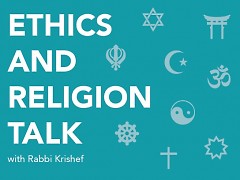Sometimes the Ethics and Religion Talk panel gets questions from people whose objective is to point out the fallacy of treating the Bible as sacred literature or the ridiculousness of religion in general. Elisa’s question appears to be in that category: "Did the supposed serpent in the supposed Garden of Eden have fangs? If so, why? If not, why not?” Most of the time I delete such questions. However, in this case I decided to take up the implicit challenge and pose a more general question to the panel: What criteria do you use to decide whether to take a particular Biblical story literally or not? What kinds of stories are you reluctant to take literally?
Rev. Ray Lanning, a retired minister of the Reformed Presbyterian Church of North America, responds:
“Many decades of Bible study as a lifelong Presbyterian have persuaded me that Scripture is the best interpreter of Scripture. ‘The infallible rule of interpretation of Scripture is the Scripture itself’ (Westminster Confession, Ch. I, Sec. IX). That is to say, the text and context of any particular verse or passage of Scripture, read in the light of the general teaching of Scripture, supply all the needed cues or clues for a right understanding of the text in hand.
“For example, Christ intentionally cast much of his teaching and preaching in parables or analogies drawn from human experience. To read them literally is a mistake. The parable of Dives and Lazarus (Luke 16:19-31) is not intended to teach that souls in hell can communicate with saints in heaven. But to reduce the teaching of Genesis 3 to a debate over the serpent’s fangs is childish nonsense, demeaning to the intelligence and spiritual vision of Moses. ‘The natural man receiveth not the things of the Spirit of God: for they are foolishness unto him: neither can he know them, because they are spiritually discerned’ (I Corinthians 2:14). We are not obliged to suffer fools gladly.”
Father Kevin Niehoff, O.P., a Dominican priest who serves as Adjutant Judicial Vicar, Diocese of Grand Rapids, responds:
“When one reads the story of Adam and Eve’s fall from grace in Genesis Chapter 3 of the English Standard Version of the bible, one notes that prior to God’s discovery that Adam and Eve had eaten the forbidden fruit, the serpent is described as like the other livestock. This means the serpent had legs. Only after the serpent convinced Eve to eat of the fruit and give it to Adam was serpent banished to slither on its belly.
“Let us not forget the bible was written down after years of being transmitted through verbal stories. Although there may be religious traditions that disagree with the following, what is important is not the literal words but the meaning.
“Here are Adam and Eve in an idyllic paradise, living together with God. God created Adam and Eve with free will. God also allowed evil to be present in this most serene and happy place. God had given Adam and Eve the ability to make their own choices and placed boundaries. When the boundaries were violated, there was banishment from the Garden of Eden.
Human beings today have the same free will as Adam and Eve. Evil is still present. What is the Holy Spirit continuing to teach us with the paradox of the choice between good and evil?”
The Rev. Sandra Nikkel, head pastor of Conklin Reformed Church, responds:
“The consensus on the criteria used to decide what Biblical stories are to be taken literal is not as important as the absorption of the lesson being taught. ‘For the word of God is alive and active. Sharper than any double-edged sword, it penetrates even to dividing soul and spirit, joints and marrow; it judges the thoughts and attitudes of the heart.’ (Hebrews 4:12) The Word of God is active and living. It contains power that penetrates the deepest parts of our being to transform, heal, and separate us from the confusion and dysfunction of this age. That's the power of the Word!”
My response:
As you read a great work of literature, when you are inside the story and truly engaged by the work, you treat it as if it were really happening. At the end of the story, you take a step back and think critically about what you read. You might use historical and literary scholarship to analyze the meaning of the story. Our understanding of the story ought to be shaped by its intended purpose, so an intelligent reader doesn’t approach Jules Verne, Shakespeare, Grimm’s Fairy Tales, and the bible the same way.
Every word of the Hebrew Bible is absolute historical and scientific truth. At the same time, every word is fiction. Proper reading requires an awareness of the type of narrative. Some material is legal, some is instructional, some describes mythic history, some lays out possible positive or negative futures. By careful reading, an intelligent reader can discerns the meaning or meanings of a Biblical text.
This column answers questions of Ethics and Religion by submitting them to a multi-faith panel of spiritual leaders in the Grand Rapids area. We’d love to hear about the ordinary ethical questions that come up on the course of your day as well as any questions of religion that you’ve wondered about. Tell us how you resolved an ethical dilemma and see how members of the Ethics and Religion Talk panel would have handled the same situation. Please send your questions to [email protected].
The Rapidian, a program of the 501(c)3 nonprofit Community Media Center, relies on the community’s support to help cover the cost of training reporters and publishing content.
We need your help.
If each of our readers and content creators who values this community platform help support its creation and maintenance, The Rapidian can continue to educate and facilitate a conversation around issues for years to come.
Please support The Rapidian and make a contribution today.
